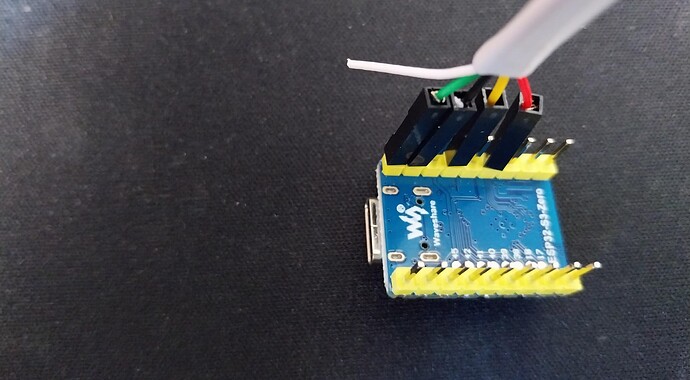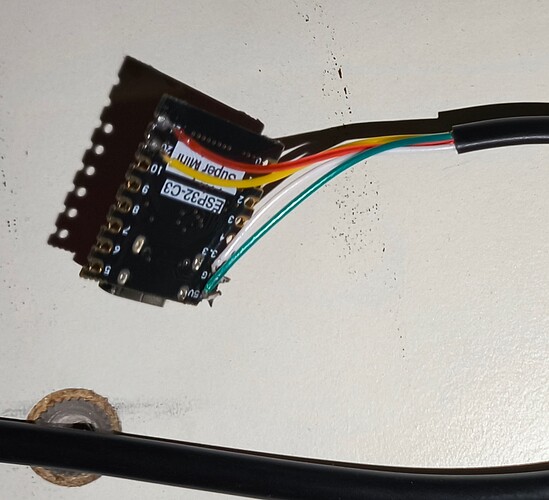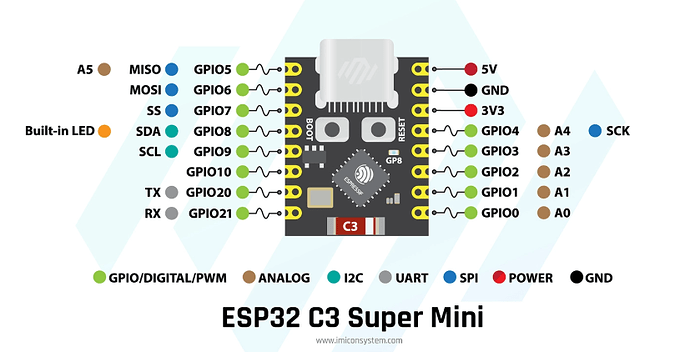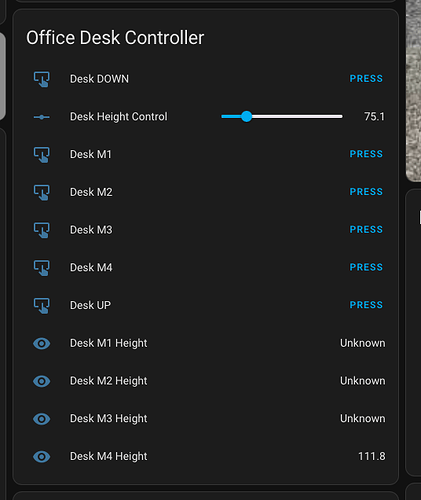Hey, thanks for the update!
I changed my setup according to your image, now everything works!
After some experimentation, I simplified the whole thing a bit. I tested it both with and without the resistors, and it seems to be just fine without them, this is what it looks like now:
| RJ12 | COLOR | ESP32 PIN |
|---|---|---|
| PIN 1 | white | |
| PIN 2 | brown | GND |
| PIN 3 | green | RX (GPIO3) |
| PIN 4 | yellow | 5V |
| PIN 5 | purple | TX (GPIO1) |
| PIN 6 | red |
(using the numbering like in our previous pictures, colours might be different depending on your cable used)
Turns out the RJ12 port supplies enough power for the ESP32-S3-Zero that I’m using, making the whole thing even cleaner.
Here’s a photo after soldering:
And here’s the yaml once again, configured for my model of ESP32, without the deskenable and presence features.
deskcontrol.yaml
esphome:
name: deskcontrol
friendly_name: DeskControl
includes:
- desk.h
on_boot:
priority: 800
then:
- uart.write: [0xf1, 0xf1, 0x07,0x00,0x07,0x7e,0xf1, 0xf1, 0x08,0x00,0x08,0x7e,0xf1, 0xf1, 0x09,0x00,0x09,0x7e,0xf1, 0xf1, 0x0c,0x00,0x0c,0x7e,0xf1, 0xf1, 0x0e,0x00,0x0e,0x7e]
esp32:
board: esp32-s3-devkitc-1
framework:
type: arduino
# Enable logging
logger:
# Enable Home Assistant API
api:
ota:
platform: esphome
password: !secret ota_pass
wifi:
ssid: !secret wifi_ssid
password: !secret wifi_pass
# Enable fallback hotspot (captive portal) in case wifi connection fails
ap:
ssid: "Deskcontrol Fallback Hotspot"
password: "fopfxEuvlxy3"
captive_portal:
uart:
- id: desk_uart
tx_pin: TX
rx_pin: RX
baud_rate: 9600
debug:
direction: BOTH
after:
bytes: 9
sequence:
- lambda: UARTDebug::log_int(direction, bytes, ',');
custom_component:
- lambda: |-
auto my_custom = new MyCustomComponent(id(desk_uart));
return {my_custom};
sensor:
- platform: template
name: "Desk M1 Height"
id: "deskm1"
filters:
- lambda: !lambda |-
if (x <1 ) return {};
return x/10;
- platform: template
name: "Desk M2 Height"
id: "deskm2"
filters:
- lambda: !lambda |-
if (x <1 ) return {};
return x/10;
- platform: template
name: "Desk M3 Height"
id: "deskm3"
filters:
- lambda: !lambda |-
if (x <1 ) return {};
return x/10;
- platform: template
name: "Desk M4 Height"
id: "deskm4"
filters:
- lambda: !lambda |-
if (x <1 ) return {};
return x/10;
button:
- platform: template
name: Desk UP
id: my_deskup
on_press:
- logger.log: UP Pressed
- uart.write: [0xf1, 0xf1, 0x01,0x00,0x01,0x7e]
- platform: template
name: Desk DOWN
id: my_deskdown
on_press:
- logger.log: DOWN Pressed
- uart.write: [0xf1, 0xf1, 0x02,0x00,0x02,0x7e]
- platform: template
name: Desk SIT
id: my_desksit
on_press:
- logger.log: SIT Pressed
- uart.write: [0xf1, 0xf1, 0x05,0x00,0x05,0x7e]
- platform: template
name: Desk STAND
id: my_deskstand
on_press:
- logger.log: STAND Pressed
- uart.write: [0xf1, 0xf1, 0x06,0x00,0x06,0x7e]
- platform: template
name: Desk FULLUP
id: my_deskfullup
on_press:
- logger.log: FULLUP Pressed
- uart.write: [0xf1, 0xf1, 0x28,0x00,0x28,0x7e]
- platform: template
name: Desk test
id: my_desktest
on_press:
- logger.log: TEST Pressed
- uart.write: [0xf1, 0xf1, 0x07,0x00,0x07,0x7e,0xf1, 0xf1, 0x08,0x00,0x08,0x7e,0xf1, 0xf1, 0x09,0x00,0x09,0x7e,0xf1, 0xf1, 0x0c,0x00,0x0c,0x7e,0xf1, 0xf1, 0x0e,0x00,0x0e,0x7e]
number:
- platform: template
name: "Desk Height Control"
id: "deskSlider"
step: 1
min_value: 677
max_value: 1241
mode: slider
set_action:
- uart.write: !lambda |-
int a= (int(x) & 0xff);
int b= ((int(x) >> 8) & 0xff);
int c= (a+b+0x80+0x02) & 0xff;
return {0xf1, 0xf1, 0x80, 2, b,a,c,0x7e,0xf1, 0xf1, 0x1b, 0x00, 0x1b,0x7e};
Hope this can help others with a Maidesite T2 Pro Plus, too.












